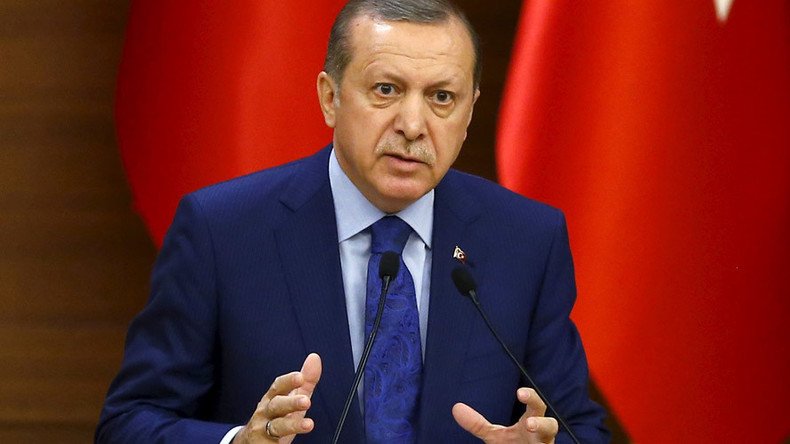'Turkish method of silencing criticism being exported to Europe'

By using insult laws against average citizens the Turkish authorities are trying to suppress any criticism of Erdogan’s regime both in Turkey and Europe, Scott Griffen, Director of Press Freedom Programs at the International Press Institute, told RT.
Turkish Prime Minister Ahmet Davutoglu said “freedom of the press should never negate respect for human dignity,” and that insults against President Recep Erdogan do not constitute freedom of speech. Meanwhile, the international Reporters Without Borders organization criticized Ankara saying that "anyone who writes anything that's critical of Erdogan can be personally prosecuted.”
RT: On those concerns raised by Reporters Without Borders. Is Erdogan pushing too far now by trying to influence what's being said about him and Turkey in Europe itself?
Scott Griffen: Yes, I think that is what we’re seeing. As you know this situation that has been brewing in Turkey for some time now, close to 2,000 criminal cases of insulting the president have been opened since Erdogan took office. What we’re seeing now is essentially the exportation of this approach towards silencing criticism to Europe. We saw this initially with the Jan Boehmermann case in Germany. Unfortunately, the way that case was handled in Germany, by the German government, has not set a very good precedent.
In terms of the example that was just discussed in Switzerland, in Geneva – these are the kinds of cases that we expect to occur more often now. Indeed, this is correct that this began inside Turkey using these kinds of insult laws to suppress any criticism of the Turkish government and the Turkish President, which it appears that Turkish authorities are now taking the same approach toward criticism of President Erdogan abroad and it is very important.
RT: So far we've seen EU politicians bowing to Ankara's pressure, for example Chancellor Angela Merkel in the case with the German comedian, why is this happening?
SG: I wouldn’t say that the government caved in, but I think it was not the right response, particularly when Chancellor Merkel told Erdogan in a phone call that she felt that the poem was purposively hurtful. This is not the kind of public response to freedom of expression that we would want to see from an EU head of state. Because again even if you say: ‘Well, we’re going to let the German courts decide about this,’ – there is now a perception that these kinds of cases are somehow acceptable; that there is room here to discuss about whether this can be prosecuted or not. That is very dangerous in our view.
RT: Within Turkey, what is President Erdogan trying to achieve with this policy of pressure and fear, arresting people who says anything critical?
SG: In terms of the use of insult laws, I think it is very clear what it is trying to be achieved here, which is the silencing of criticism against him. We have seen these insult laws used not only against journalists, but in fact against a very diverse group of people: academics, schoolchildren, beauty pageant queens, just average citizens.
Why does any political figure turn to these kinds of laws? It is an attempt to silence criticism, to not allow debate about certain policies that are taking place in Turkey. Many of these cases have been related to the Kurdish question, or they have been even related to Turkey’s policy towards the Islamic State, or Turkey’s international politics. So this is simply one way of stopping that debate, and not allowing people to question what the government is doing essentially. This is why these laws are used… They are archaic laws meant to protect those in power. That is the only reason that we can see from this.
Everyone has a right to dignity and to be protected from, for example, false accusations of fact, but this isn’t what the cases are about. This is about people, who are expressing their opinions about what the government is doing, what Erdogan is doing, how Turkey is reacting to certain international political issues.
The statements, views and opinions expressed in this column are solely those of the author and do not necessarily represent those of RT.













